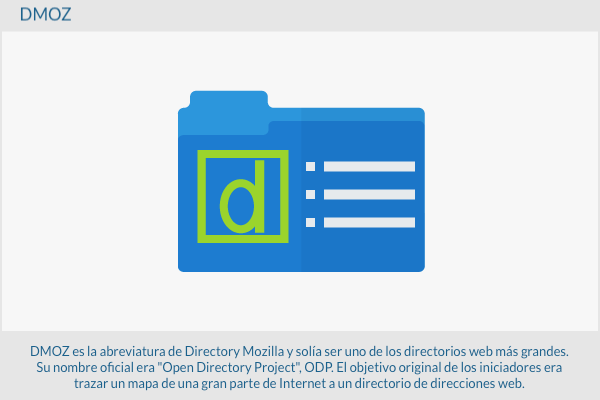DMOZ It is short for "Directory Mozilla" and used to be one of the largest web directories. Its official name was "Open Directory Project", ODP. The original goal of the initiators was to map a large part of the Internet to a directory of web addresses. What was special about DMOZ was that it had no business background and was maintained by volunteer publishers. For a long time, Google used the meta description that was part of the DMOZ description of a web page for SERP snippets. On March 17, 2017, the DMOZ project was terminated by its operator, AOL.

Background
The Open Directory Project (ODP) was started in the summer of 1998 by founders Rich Skrenta and Bob Truel. At that time, the directory was called Gnuhoo, and shortly after, Newhoo. However, just four months after its launch, Newhoo was bought by Netscape and renamed the Open Directory Project. After Netscape was acquired by AOL and AOL merged with Time Warner, the project was supported by these large companies until its completion.
The DMOZ name consists of the first address in the directory: directory.mozilla.org. Since then, the domain dmoz.org has been used for the entire directory. One of DMOZ's goals was to make information more easily available to users. During its creation, it was not as simple as at this time to get relevant information on websites, for example, through the search in the Google search engine. Google itself was still in its infancy. At the same time, DMOZ was a non-commercial model of a web directory that did not rely on automated entries like many other directories. DMOZ content was subject to the "Open Content" guidelines and thus could be shared and used without infringing copyright laws. This fact led to the rapid dissemination of this directory.
The content was edited and disseminated by volunteer editors. Generally, an editor was in charge of a specific compilation of subjects. Until its demise, DMOZ was available in more than 60 different languages. However, the volunteers could barely keep up with the rapid development of Internet content and there were usually delays in updating each category. In February 2017, the AOL business group announced its intention to terminate the web directory, an announcement that surprised its users. In March 2017, DMOZ was closed indefinitely.
A static copy of dmoz.org still exists. In this site,[1] users can still search for entries, but there is no edit and no new entries will be added.
Structure
The ODP was organized by topic and country / region. Any webmaster can register their website there, but publishers can reject a request if it does not meet the requirements.
An entry in DMOZ always consisted of a title, which was linked to the registered website and a short description. Additionally the destination URL was shown. If a user searched for a specific definition with the search bar, they would see the matching entries that could also be narrowed down by topic or region respectively.
Entry requirements
The user would find a suitable category on dmoz.org and then click on the "Suggest URL" link. An input field was opened in which all the relevant data for the domain were entered. The description itself was very short and included a minimum of 25 and a maximum of 30 words.
If a user wanted to make sure that the selected category was edited regularly, they had to check the date of the last update at the bottom of the page. If this was several years ago, it could be assumed that there was no longer an editor assigned to this category. If a publisher verified an entry, they would have released or rejected it.
Since DMOZ was maintained manually, this web catalog was considered a trusted source by Google. Until 2011, Google had its own web directory that was based on ODP data and served to enrich its own search index.
Google used DMOZ to generate SERP snippets, for example, for websites, where the search engine could not identify any information on its own. If you didn't want Google and other search engines to rely on the DMOZ databases, you would have annotated it in the metadata with NOOPD. This indication is no longer necessary.
DMOZ and SEO
A listing on DMOZ was considered a "secret weapon" by SEOs for a long time. Due to the high quality of the manually maintained directory, an ODP backlink was possibly an important indicator for Google as well. However, over the years, Google, like other search engines, has vastly improved its algorithms and this has made an entry in this directory almost irrelevant.
The question of the importance of DMOZ for SEO is discussed repeatedly, despite everything, in SEO circles. Regarding the question "Is DMOZ dead?", There were more than six million search results in the Google search engine. Now the question can be answered with a simple "yes", because the directory no longer exists in its current form.
The editor of the OPD "tschild" now manages the domain dmoz.de on his own and informs users about the end of dmoz.org. He had volunteered for the ODP for 19 years, and was shocked by the decision to end DMOZ.
Web Links



